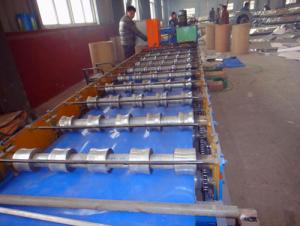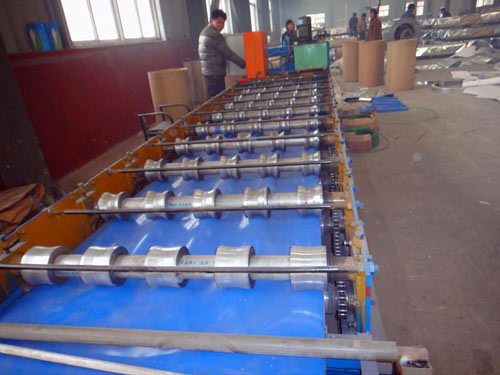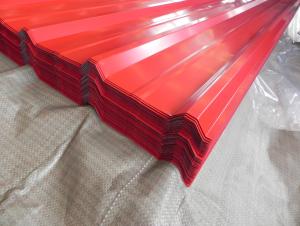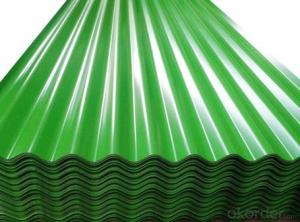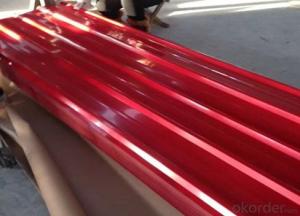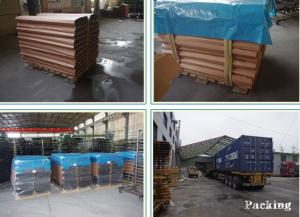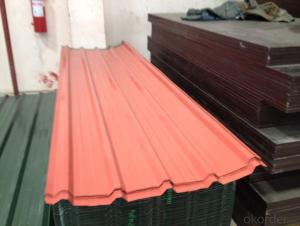color coated roofing sheet
- Loading Port:
- China Main Port
- Payment Terms:
- TT OR LC
- Min Order Qty:
- -
- Supply Capability:
- -
OKorder Service Pledge
Quality Product, Order Online Tracking, Timely Delivery
OKorder Financial Service
Credit Rating, Credit Services, Credit Purchasing
You Might Also Like
color coated roofing sheet
1) Quality Standard & Grade: JIS G3302, SGCC / ASTM 653M CQ/ EN10142 DX51D+Z
2) Zinc coating : 50g/m2
3) color film thickness:20micro(doubled)
4) Surface Treatment: chromated , non oiled, skin passed
5) Packing: export standard packing,packed with moisture resistant paper and metal
wrapping,securely tied for export,on metal skids) Country of Origin :
SIZE:0.27mm*840mm(1000mmBEFORE)*3660MM
COLOR:RED
- Q: Can steel sheets be used for making staircases?
- Yes, steel sheets can be used for making staircases. Steel is a durable and strong material that can support heavy loads, making it suitable for constructing staircases. Steel sheets provide a stable foundation and structural integrity for staircases, ensuring safety and longevity. Additionally, steel can be easily shaped and molded into various designs, allowing for flexibility in staircase aesthetics. Whether it is a residential, commercial, or industrial setting, steel sheets are a popular choice for constructing staircases due to their strength, durability, and versatility.
- Q: Can the steel sheets be used for roofing purposes?
- Yes, steel sheets can be used for roofing purposes. Steel roofing sheets are a popular choice due to their durability, strength, and resistance to harsh weather conditions. They provide excellent protection against elements such as rain, snow, and hail. Steel roofing sheets are also fire-resistant and can withstand high winds, making them a reliable option for roofing. Additionally, steel sheets are lightweight, which makes them easier to install and reduces the load on the structure. They are available in various designs and colors, allowing for customization according to individual preferences. Overall, steel sheets are a versatile and practical choice for roofing purposes.
- Q: Can steel sheets be used for insulation cladding?
- No, steel sheets are not typically used for insulation cladding. Insulation cladding is usually made of materials with thermal insulation properties such as foam boards, mineral wool, or fiberglass. These materials are chosen for their ability to reduce heat transfer and improve energy efficiency. Steel sheets, on the other hand, are commonly used for structural purposes or as a protective layer due to their strength and durability. While steel sheets can provide some level of protection, they do not possess the necessary insulation properties to effectively prevent heat or cold transfer. Therefore, it is recommended to use appropriate insulation materials specifically designed for cladding purposes.
- Q: Can steel sheets be used for signage or displays?
- Yes, steel sheets can definitely be used for signage or displays. Steel is a versatile material that offers durability and strength, making it suitable for both indoor and outdoor applications. Steel sheets can be cut, bent, or welded into various shapes and sizes, allowing for the creation of custom signage or displays. The smooth surface of steel sheets provides an excellent canvas for painting, printing, or applying vinyl graphics, making them ideal for showcasing logos, messages, or visual content. Additionally, steel sheets can be powder coated or galvanized to enhance their resistance to corrosion, ensuring long-lasting and attractive signage or displays.
- Q: Are steel sheets suitable for swimming pool construction?
- Yes, steel sheets are suitable for swimming pool construction. They are often used as a structural material for the walls and floor of swimming pools due to their strength, durability, and ability to withstand the pressure of water. Steel sheets are resistant to corrosion and can be easily shaped to fit the desired pool design. Additionally, steel sheets provide stability and ensure the longevity of the swimming pool.
- Q: How do steel sheets perform under heavy loads or pressure?
- Steel sheets are designed to perform exceptionally well under heavy loads or pressure. Due to their high tensile strength and durability, steel sheets can withstand significant amounts of weight without bending or breaking. They offer excellent resistance to deformation and can maintain their structural integrity even when subjected to intense pressure. Hence, steel sheets are widely used in various industries for applications that require robust materials capable of bearing heavy loads or pressure.
- Q: Can steel sheets be used in HVAC systems?
- Yes, steel sheets can be used in HVAC systems. Steel is a commonly used material in HVAC systems due to its strength, durability, and resistance to corrosion. Steel sheets are often used for the fabrication of ductwork, which is an essential component of HVAC systems. The ductwork distributes the conditioned air throughout a building, ensuring proper ventilation and temperature control. Steel sheets are preferred for duct fabrication as they can withstand the high pressure and temperature conditions commonly found in HVAC systems. Additionally, steel sheets can be easily formed and joined together, allowing for the customization and installation of ductwork in various sizes and shapes. Overall, steel sheets are a suitable material choice for HVAC systems, providing reliable performance and longevity.
- Q: What is the difference between a steel sheet and a steel plate?
- The main difference between a steel sheet and a steel plate is their thickness. Steel sheets are generally thinner, ranging from 0.4mm to 6mm, while steel plates are thicker, typically starting from 6mm and can go up to several inches in thickness. Additionally, steel plates are often used for structural purposes or heavy-duty applications, while steel sheets are commonly utilized for lighter applications like roofing, cladding, or decorative purposes.
- Q: What is the difference between stainless steel and regular steel sheets?
- Stainless steel and regular steel sheets have distinct differences in their composition and properties. Stainless steel is an alloy comprising iron, chromium, and other elements like nickel and molybdenum. In contrast, regular steel is predominantly made of iron with small amounts of carbon and impurities. The primary disparity between stainless steel and regular steel sheets lies in their corrosion resistance. Due to the presence of chromium, stainless steel exhibits high resistance to corrosion. When exposed to oxygen, chromium forms a protective layer called a passive film on the surface of the steel, preventing rust formation. This makes stainless steel suitable for applications in environments with moisture or chemical exposure. On the other hand, regular steel sheets are susceptible to corrosion as they lack the protective chromium layer. To enhance their corrosion resistance, they may require additional coatings or treatments. Without proper protection, regular steel sheets can rust and deteriorate when exposed to moisture or corrosive substances. Strength and hardness are additional distinguishing factors between stainless steel and regular steel sheets. Stainless steel, with its alloy composition, is generally stronger and more durable than regular steel. It can withstand higher temperatures and has better resistance to wear and tear. Regular steel, while strong, may not offer the same level of strength and durability as stainless steel. Aesthetic appeal is another contrasting aspect. Stainless steel sheets have a shiny, reflective surface, imparting a modern and sleek appearance. They are commonly used in architectural and decorative applications where visual appeal is desired. Regular steel sheets, on the other hand, have a more dull and matte finish and are primarily utilized for structural and industrial purposes rather than for their visual appeal. In conclusion, stainless steel sheets surpass regular steel sheets in terms of corrosion resistance, strength, and aesthetic appeal. They are the preferred choice for applications where durability, hygiene, and maintenance-free performance are essential, such as in kitchens, medical equipment, automotive parts, and construction projects. Regular steel sheets, although less expensive, may require additional protective measures and are commonly employed in structural and industrial applications where corrosion resistance and visual appeal are not primary concerns.
- Q: What is the tensile strength of a steel sheet?
- The tensile strength of a steel sheet can vary depending on the specific grade and thickness of the steel. However, on average, steel sheets typically have a tensile strength ranging from 370 to 690 megapascals (MPa).
Send your message to us
color coated roofing sheet
- Loading Port:
- China Main Port
- Payment Terms:
- TT OR LC
- Min Order Qty:
- -
- Supply Capability:
- -
OKorder Service Pledge
Quality Product, Order Online Tracking, Timely Delivery
OKorder Financial Service
Credit Rating, Credit Services, Credit Purchasing
Similar products
Hot products
Hot Searches
Related keywords
